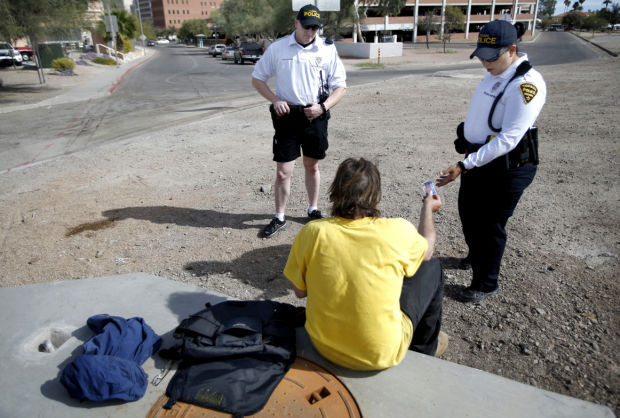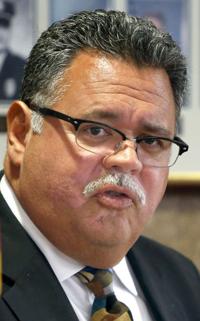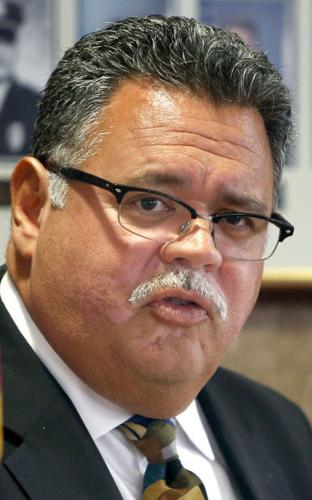УлшжжБВЅ police officers will no longer ask the immigration status of victims or witnesses of crimes as part of the departmentтs revised general orders, which seek to be more aligned with federal enforcement priorities even as they continue to follow the stateтs immigration law.
Revised on Feb. 20, the general orders on immigration policy expressly acknowledge that тmere unauthorized presence in the United States is not a criminal offense, and enforcement of such civil violations is reserved for federal authorities.т
The change comes after the Department of Homeland Security, citing limited resources, issued new guidance on who is a priority for deportation.
It includes which people federal agents and officers should stop, question and arrest as well as those who should be detained or released.
тThe change in the federal priorities in November, with respect to the enforcement priorities that the federal government would recognize for immigration enforcement, provided a basis for us to re-evaluate the general orders,т said City Attorney Mike Rankin.
People are also reading…
The updated federal guidelines are part of President Obamaтs executive action on immigration.
When it comes to people already booked, the administration is asking Immigration and Customs Enforcement to transfer those in state or local custody only if they are a priority for deportation, including suspected terrorists or convicted felons.
TPD officers now will only make an immigration inquiry if a criminal history check first reveals that the arrestee falls within one of the identified federal enforcement priorities.
Under a provision of УлшжжБВЅтs immigration law SB 1070, police officers are required to try to check the status of anyone they stop if they believe those suspects are in the country illegally.
Since the implementation of the so-called тshow me your papersт provision in 2012, the City Council has at times been at odds with Police Chief Roberto ГеОББєБєВЙВѕБ№УБДЧАљ, who has said he opposes the law but is bound to follow it.
An УлшжжБВЅ investigation last year revealed that departments across the state have adopted widely varying interpretations and protocols.
TPD is one of just a few agencies that interpreted SB 1070 to require an immigration status check on everyone arrested т regardless of whether an officer suspected unauthorized status.
Several times the УлшжжБВЅ City Council asked ГеОББєБєВЙВѕБ№УБДЧАљ to tweak his departmentтs immigration policies as the debate over the bounds to SB1070-mandated status checks roiled on.
In November, ГеОББєБєВЙВѕБ№УБДЧАљ altered the agencyтs policies to emphasize that officers should focus on suspects, not the immigration status of victims or witnesses; require the presence of a parent or guardian to question a minor on immigration status; and try to find alternatives to towing a vehicle, when possible.
But he said he couldnтt make a blanket prohibition without risking a lawsuit. A clause in the bill gives state residents the power to take legal action if they suspect an agencyтs enforcement is too lax.
The city attorney said that while it was his job to be concerned about lawsuits, the revised orders were not arrived at lightly.
тWe didnтt do this just reactionary т we put a lot of thought into it, so we certainly feel itтs defensible,т Rankin said.
He also said that the federal judge who recently put a hold on the deferred action component of the presidentтs executive action left the change in the federal enforcement priorities undisturbed.
Some of the changes under the new policy do exactly what City Council members such as Regina Romero had several times asked the department to do, but the chief had said would require him to violate the law to comply with them.
Romero said that while she did not want to diminish the effect of community pressure and the efforts by the mayor and council, the turning point were President Obamaтs actions and the new DHS guidelines.
тThat helped tremendously. The executive order alleviated the concern by Chief ГеОББєБєВЙВѕБ№УБДЧАљ that he is going to be following the letter of the law,т she said.
ГеОББєБєВЙВѕБ№УБДЧАљ was not available for comment Tuesday.
Under the new policy, officers cannot stop or detain any person, including vehicle passengers, based upon suspicion that they are in the country illegally.
This had been an issue in the past when an officer stopped a driver and subsequently inquired about the status of passengers, who were then taken into Border Patrol custody.
Also, they will not ask victims and witnesses about immigration status because these are consensual contacts, and doing so would likely тhinder or obstruct investigations and can negatively impact overall community trust and confidence.т
Under a previous revision, school resource officers arenтt allowed to ask about immigration status when interacting with minors.
The stateтs immigration law gives officers an out in cases where checking immigration status could jeopardize an investigation or is not practicable.
Another issue the City Council had repeatedly brought up was lax record-keeping.
An analysis by the Star in 2014 of thousands of records from 13 Southern УлшжжБВЅ law-enforcement agencies т including TPD т revealed a patchwork of immigration-enforcement policies and data so incomplete there was no way to determine how police were implementing the law, or whether they were committing systemic civil-rights violations opponents feared when SB 1070 was passed.
УлшжжБВЅ police created a form the dispatcher fills out when an officer requests an immigration check. But they were handwritten and the files couldnтt be easily searched.
Also, the forms donтt capture every call to Border Patrol because some officers use their cellphone, leaving dispatchers with no record the inquiry ever happened.
Last summer, TPD launched a new database designed to collect and better track the data. Under the revised general orders, officers will now have to use the departmentтs system instead of their cellphones.
With the revised orders in effect, Romero said she would like to organize informational forums to let the community know about them and how they will be instituted, and listen to any concerns people have.
Asked whether city officials were worried the revised orders might attract unwanted attention from Phoenix, Romero said that although that was a consideration, there are more important concerns.
тThe state Legislature has proven to want to micromanage the cities and towns across УлшжжБВЅ, especially УлшжжБВЅ,т she said.
тBut I donтt think that should stop us in terms of doing what we need to do, what our community wants us to do and what is right for us to do.т








